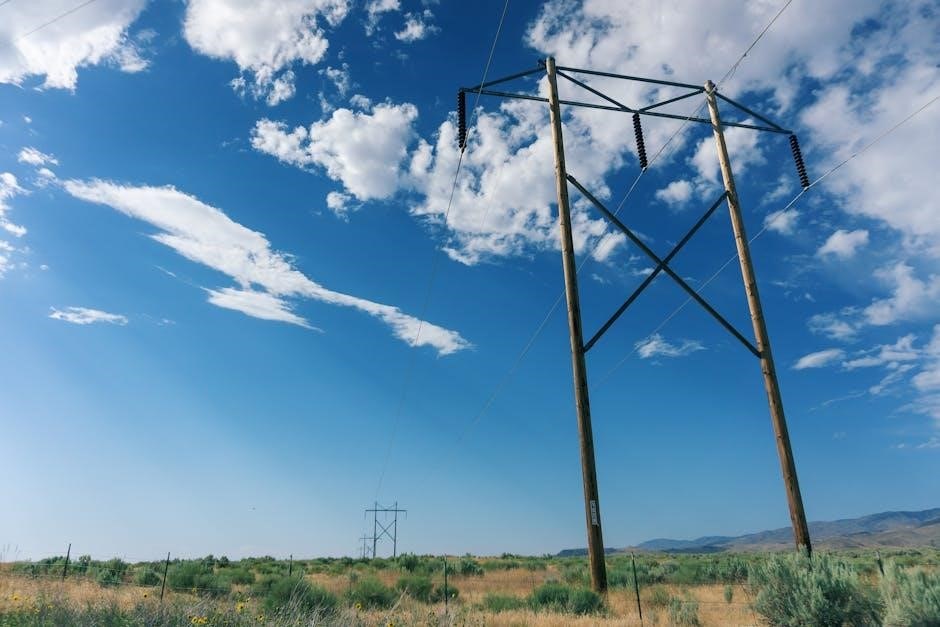
allison transmission 3000 and 4000 wiring diagram pdf
The Allison 3000 and 4000 series are heavy-duty automatic transmissions known for their durability and performance in demanding applications, including trucks, buses, and specialty vehicles․
Importance of Wiring Diagrams for Allison Transmissions
Wiring diagrams are essential for understanding and servicing Allison 3000 and 4000 transmissions, providing a clear map of electrical systems, components, and connections for diagnostics and repairs․
2․1․ Understanding Transmission Components and Their Interconnections
Transmission components in the Allison 3000 and 4000 series include sensors, solenoids, and control modules interconnected through wiring harnesses․ These components communicate via electrical signals to ensure smooth operation․

Key Components of Allison 3000 and 4000 Wiring Diagrams
The wiring diagrams feature sensors, solenoids, control modules, and wiring harnesses․ These components are interconnected to ensure proper communication and operation of the transmission system․
3․1․ Sensors, Connectors, and Wire Color Codes
The wiring diagrams for Allison 3000 and 4000 transmissions include detailed representations of sensors, connectors, and wire color codes․ Sensors monitor critical parameters like pressure, temperature, and speed, ensuring optimal transmission operation․ Connectors are clearly labeled, and their pinouts are specified to facilitate troubleshooting․ Wire color codes are standardized, with abbreviations like RD (red), WH (white), and OR (orange) used consistently․ These codes help technicians identify wires quickly and accurately․ The diagrams also provide a key for understanding symbols and abbreviations, making it easier to trace circuits and diagnose issues․ Properly interpreting these components is essential for maintaining and repairing the transmission’s electrical system effectively․
How to Read Allison Transmission Wiring Diagrams
Understanding Allison wiring diagrams requires interpreting symbols, abbreviations, and wire colors․ Referencing the included key ensures accurate identification of components and connections for effective troubleshooting and repairs;
4․1․ Abbreviations and Symbols Used in the Diagrams
Allison wiring diagrams utilize specific abbreviations and symbols to represent components, connections, and functions․ Common symbols include circles for connectors, squares for splices, and lines for wires․ Abbreviations like “RD” for red, “WH” for white, and “YL/YE” for yellow are used to denote wire colors, ensuring clarity․ Symbols such as circuit breakers, fuses, and diodes are also included to simplify troubleshooting․ Understanding these elements is crucial for accurately interpreting the diagrams and performing repairs․ The diagrams often include a legend or key that explains each symbol and abbreviation, making it easier for technicians to identify components and trace connections․ This standardized system ensures consistency and accuracy when working with Allison 3000 and 4000 series transmissions․
4․2․ Understanding Connector Pinouts and Wire Harness Layouts
Connector pinouts and wire harness layouts are critical components of Allison wiring diagrams, detailing the precise arrangement and connections within the transmission system․ Each connector is identified by its pin configuration, which specifies the function of each wire․ Wire harness layouts illustrate how wires are bundled and routed, ensuring proper electrical connections․ These diagrams often include detailed keys that explain the role of each pin and wire color, simplifying the identification process․ Technicians rely on these layouts to diagnose issues, such as short circuits or faulty connections․ Proper understanding of pinouts and harness layouts is essential for accurate repairs and maintaining system integrity․ Always refer to the official Allison manuals for precise information, as incorrect connections can lead to transmission malfunctions or safety hazards․

Troubleshooting Common Issues Using Wiring Diagrams
Wiring diagrams simplify troubleshooting by visually identifying fault locations, enabling technicians to trace and resolve electrical issues efficiently, ensuring optimal transmission performance and reliability․
5․1․ Identifying Fault Codes and Diagnostic Procedures
Wiring diagrams play a crucial role in diagnosing issues with Allison 3000 and 4000 transmissions by helping technicians identify fault codes and trace electrical malfunctions․ Fault codes, such as P1712 for torque converter lockup issues, provide specific clues about system failures․ By referencing the wiring diagram, technicians can pinpoint the exact sensors, connectors, or wires linked to the fault code․ Diagnostic procedures often involve checking for short circuits, open connections, or damaged wiring․ The diagrams also guide technicians in using specialized tools to monitor transmission performance and isolate problems․ Regular updates to diagnostic manuals ensure technicians stay informed about new codes and procedures․ This systematic approach minimizes downtime and ensures accurate repairs, maintaining the transmission’s reliability and efficiency in various applications․
5․2․ Repairing Damaged Wires and Connectors
Repairing damaged wires and connectors in Allison 3000 and 4000 transmissions requires precision to ensure proper system functionality․ Wiring diagrams guide technicians in identifying damaged components, such as frayed wires or corroded connectors․ Repairs often involve replacing faulty wires with high-quality, heat-resistant alternatives and securing them with proper insulation․ Connectors should be cleaned or replaced if damaged to prevent signal loss․ Technicians must use specialized tools to crimp and solder wires, ensuring secure connections․ After repairs, the system should be thoroughly tested to confirm all circuits function correctly․ Properly repairing wiring ensures reliable transmission performance, prevents further damage, and maintains optimal vehicle operation․ Regular maintenance, as outlined in the wiring diagrams, helps minimize the risk of future issues․
Applications of Allison 3000 and 4000 Transmissions
Allison 3000 and 4000 transmissions are widely used in heavy-duty trucks, buses, and specialty vehicles, offering reliable performance in demanding applications like construction, public transport, and industrial machinery․
6․1․ Vehicle Compatibility and Installation Requirements
Allison 3000 and 4000 transmissions are designed for compatibility with a wide range of heavy-duty vehicles, including trucks, buses, and specialty machinery․ Proper installation requires adherence to specific guidelines, such as using stubs or termination resistors with shift selectors, as pass-through capabilities are not available on these models․ The Oil Level Switch (OLS) is standard on 3000 MH, 4000 MH, and T Series transmissions, ensuring optimal performance in demanding applications․ Vehicle compatibility is determined by factors like engine type, torque capacity, and intended use, with detailed specifications outlined in official Allison manuals․ Correct installation ensures smooth operation, reduces wear, and prevents potential failures․ Always refer to the wiring diagram for precise connector and sensor configurations to match the vehicle’s electrical system․

Resources for Downloading Allison Transmission Wiring Diagrams
Official Allison websites and third-party forums offer downloadable wiring diagrams for 3000 and 4000 series․ These PDFs include schematics, abbreviations, and connector details for easy reference․
7․1․ Official Allison Transmission Websites and Manuals
The official Allison Transmission website is the most reliable source for obtaining wiring diagrams and manuals for the 3000 and 4000 series․ These resources are designed to provide comprehensive technical information, ensuring accurate repairs and maintenance․ The website offers downloadable PDF documents, including wiring schematics, troubleshooting guides, and parts catalogs․ Additionally, Allison Transmission service manuals, such as SM4013EN and SM4014EN, are available for detailed insights into electrical and hydraulic systems․ These manuals include color-coded diagrams, connector pinouts, and step-by-step instructions․ Official resources are regularly updated to reflect the latest technical specifications and enhancements․ For authenticity and accuracy, it is highly recommended to use these official materials․ Authorized Allison dealers and service centers also provide access to these documents, ensuring mechanics and technicians have the tools needed for efficient servicing․
7․2․ Third-Party Sources and Forums
Beyond official channels, third-party websites and forums offer additional resources for Allison 3000 and 4000 wiring diagrams․ Platforms like Scribd and specialized automotive forums provide access to shared documents, including PDFs of wiring schematics and troubleshooting guides․ These sources often include user-contributed content, offering real-world insights and solutions from experienced technicians․ However, caution is advised when using third-party materials, as they may not always be up-to-date or accurate․ Verification against official Allison documentation is recommended to ensure reliability․ Forums also serve as valuable communities for discussing common issues and repair techniques, allowing professionals to collaborate and share knowledge․ While not a substitute for official manuals, third-party resources can complement the diagnostic and repair process, offering diverse perspectives and practical advice․
Allison Transmission 3000 and 4000 wiring diagrams are indispensable tools for understanding and maintaining these complex systems․ By providing detailed insights into component interconnections, sensor functions, and troubleshooting procedures, these diagrams empower technicians to diagnose and repair issues efficiently․ Whether sourced from official manuals, third-party websites, or forums, the diagrams are essential for ensuring optimal transmission performance․ Regular updates and cross-referencing with official resources are crucial for accuracy․ Mastering these wiring diagrams not only enhances diagnostic skills but also ensures reliable operation of Allison transmissions in various applications․ They remain a cornerstone of modern transmission maintenance and repair practices․
Leave a Reply
You must be logged in to post a comment.